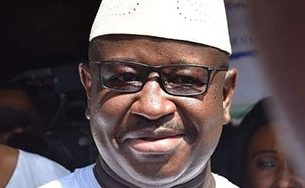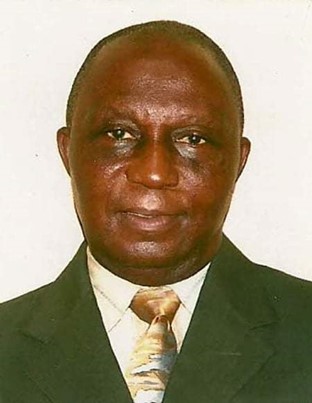Is this a defining moment for Sierra Leone?
Economic development is an essential element for every country but it is especially crucial for those countries emerging from a protracted armed conflict with the aim of consolidating the peace, recovery and reconstruction process. The war in Sierra Leone contributed to the collapse of most, if not all, institutions and physical infrastructure, including electricity, water, roads, and transport and communication. Corruption was endemic, while transparency and the rule of law were extremely weak. These are all strong limiting factors on economies shattered by conflict. They have not only lowered the confidence of entrepreneurial investments, but also deprived the nation of human capital as she struggles to cope with the effects of brain drain and capital flight. (Photo: Abdulai Abubakarr Conteh, author)
Since the end of the war in Sierra Leone in 2002, foreign aid and foreign direct investment (FDI) has been the two main sources for our nation’s development. Many post-conflict countries fall into this category, desperately in search of increased foreign investment to supplement the flow of aid into the country, revitalize their industries and rebuild their infrastructures. But we need to be very cautious of how this is done especially with the issue of foreign investment in our country. For the simple reason that Sierra Leoneans would like to know how does foreign investment affect their lives and its contribution to the socio-economic development of our nation. When carefully managed as part of a comprehensive investment strategy the benefits are enormous. If realized, this can be a valuable contribution towards achieving the long-term economic and political stability that is desperately needed in Sierra Leone.
Arguably, poor countries are more dependent on aid, while most lack the ability to attract foreign investment. This could be as a result of all the limiting factors explained above and also because, all the basic elements of the legal system are not efficient, and policies towards investment were not favourable. These are powerful deterrents to foreign investors who might otherwise consider making an investment in a post-conflict country. Those that do make investments may require much higher rates of return, given the increased risks of conducting business without an effective legal recourse for unlawful actions. Therefore in the immediate aftermath of conflict, the main challenge for a government faced with tight constraints on financial, human resources and high competition for public spending priority is establishing a legal framework to attract foreign investment. The government may also consider additionally adopting the international legal framework because of it global reach and applies to investments generally.
President Koroma’s Agenda for Change has provided a road map for Sierra Leone with clear objectives that focused on four key priority areas, and these are absolutely important if our country is to emerge as a strong nation. The President strongly believed that agriculture and food security; infrastructure and transportation; energy and water resources; and human development are the impetus to the development of our nation. The President described these objectives as “holding the key to our ability and capacity to lift the people of Sierra Leone out of the type of poverty that we all know continues to relegate our country to the last rungs of the Human Development Indices”. The economic model pursued by the Ernest Koroma government is a production-and-employment-oriented approach to poverty reduction as well as a development-driven approach to trade rather than a trade-driven approach to development. This economic model not only needs the support of the international community but all Sierra Leoneans.
Of course, everyone would agree with me that development aid alone cannot transform damaged economies into vibrant, self-sufficient systems, but foreign investment can bring added advantages, and can eventually even eliminate the need for foreign aid if implemented and managed properly. On his visit recently to Sierra Leone, the UK Development Secretary, Andrew Mitchell said that “achieving transparency in the exploitation of mineral resources is one of the most fundamental aspects of development. He echoed that if taxpayers of the United Kingdom are supporting poverty reduction strategies in countries with significant resources interests that are not being used in the people’s interest, this will bring the use of taxpayers’ money into massive disrepute.” The Secretary of State also mentioned that President Koroma has been accused of corruption in recent mining deals, and warned he is watching particularly carefully how Sierra Leone intends to exploit its mineral resources. He went on to say “it is an important issue that requires openness and transparency and if not he is prepared to act.” (Reported in Awoko newspaper, August 10, 2010). Act in what capacity? Is Andrew Mitchell the officer in charge (OIC) of our mineral resources in Sierra Leone? Can Mr. Mitchell also provide evidence of corrupt mining deals of the Ernest Koroma government? All these comments were made as a result of our dependency on Britain and other countries for aids. I think it is time for us to effectively manage our resources.
The recent influence of China in Africa has made the prices of minerals in particular to appreciate. Our natural resource extraction is primarily export-oriented, with significant potential for income generation. So is this a defining moment for Sierra Leone? Can Sierra Leone seize this opportunity once again to develop her infrastructure, improve on the educational system, improve on the health services, roads, and above all the communities from which these minerals are extracted? The poorest of poor countries are hardly ever attractive to multinational corporations in search of markets and profits unless those countries endowed with abundant natural resources. It is therefore unsurprising that investments in extractive industries such as oil, diamonds and other minerals make up the majority of investment flows to many developing countries, especially in Africa.
However such industrial activities also inevitably bring associated negative environmental and social impacts; this phenomenon is prevalent in most of Africa’s resource-rich countries. This must be carefully taken into consideration when designing strategic policy to attract and regulate foreign investment. Attracting unsuitable or inappropriate forms of investment flows risks not only losing potential benefits to the host economy, but can even actively hinder development and lead to negative consequences on local communities and on the environment.
Countries which are heavily dependent on exporting only one resource are vulnerable to fluctuations in demand, and extraction of any particular resource is an inherently temporary activity – only lasting until the resource is exhausted. Crucially, any investment programme must recognize that foreign investment is part of economic development within a reconstruction and nation building process, and not an end in itself. The investment programmes are important not only for attracting new investment, but to also encourage existing investors to re-invest or to increase levels of investment. In addition, it can offer protection and privileges for diasporas to return and assist in the reconstruction of their country. Retrospectively, past economic experiences, past conflict and local cultures should inform the adoption of post-conflict private investment programmes that are specifically tailored to the country’s needs. I would also like to draw the attention of President Koroma’s government to the following:
A more beneficial arrangement for our natural resources is for the government to incorporate the Build, Operate and Transfer (BOT) mechanism. This could be achieved through a form of project financing, whereby the government grants concessions to companies to finance and build a particular service or facility, operate it, and subsequently transfer it back to government ownership after the project has paid for itself. By persuading multinational corporations to establish local processing facilities, this could bring the infusion of capital, technology and know-how necessary for sustainable economic growth. For instance local processing facilities funded by BOT could allow Sierra Leone to add value to our natural resources before been exported overseas.
It is also necessary for the government to know that tax incentives to multinational corporations are one area where it is particularly vital to distinguish between investment flows and real contributions to socio-economic development. My major concern here is that corporations may invest in a country solely to benefit from these incentives, without making any real contribution to the sustainability of the country’s economy. Therefore implementing extremely liberal tax policies in pursuit of foreign investment tends to attract a certain form of investment flows that may entirely be motivated by the benefits conferred by a tax haven.
Privatization as a central element of the neo-liberal economic policies is generally advocated for developing countries by the international financial institutions. The economic policies of post-conflict countries have often been overly concerned with the investment flows from privatization, without adequately anticipating and mitigating the negative consequences such as down-sizing of labour and price increases. When implemented poorly, or in the wrong situation, privatization brings the disadvantages of monopolization rather than the benefits of free market competition. I would like the government to see privatization as one available option within the wider economic development and investment strategy of post-conflict countries, with the choice of whether and how to privatize specific services guided by a detailed socio-economic cost and benefit analysis.
Desperation for investment to provide the capital needed for the effective functioning of our domestic economy could result in policies which focus on investment promotion without taking into consideration the potential consequences, at the expense of vulnerable peoples, their communities, and the economy. A more radical private sector led development may have negative impacts on the majority of the population, and could result in wealth being concentrated in the hands of the very wealthy. Good policies always tend to substantially reduce the incidence of conflicts because they alleviate the plights of citizens, or are tailored to address their concerns. It is worth mentioning the case of Rwanda, which is seen by many as a success story because it adopted policies considered by international financial institutions to be ideal, implementing a largely deregulated investment programme in order to attract foreign investment. But despite this perceived success in attracting foreign investment, the United Nations Human Development Report (2008) ranks Rwanda 161 out of 177 countries on the human development index. While Nigeria, a country with one of the highest levels of foreign investment flows in Africa was ranked 158th in the same report, demonstrating that foreign investment alone cannot make countries socially sustainable – even countries without the challenges of post-conflict recovery.
I, like many other Sierra Leoneans out there are optimistic that President Koroma is capable and has got the political will (most important quality of a leader) to change Sierra Leone. I also believe that the President will set the bar for any future leader of Sierra Leone. One thing that is crystal clear is that Sierra Leone ten, fifteen, or twenty years back is not the same Sierra Leone we have today. The time has gone when politicians would only go to their constituencies when it is time for election. Sierra Leoneans are now more involved in the political process than any time in the history of our country, and want a leader that can deliver. Good policies needs to be practicalized – action. Our development process should not be left solely to market forces alone, but should also aim to build a state with functioning institutions that drive confidence in the investment sector without administrative bottlenecks, but which does not trade the well being of the population in the competition for foreign capital.
By Abdulai Abubakarr Conteh
The author holds B.Sc Ed in Mathematics/Economics from N’jala University, MSc in Statistics & Management Science and MSc in Finance from the University of the West of England in Bristol UK, and currently a PhD candidate in Development Economics at Brunel University West London.
Stay with Sierra Express Media, for your trusted place in news!
© 2010, https:. All rights reserved.






